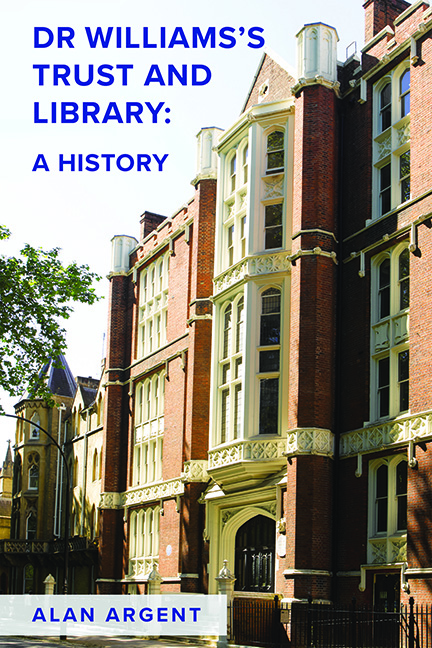Book contents
- Frontmatter
- Dedication
- Contents
- List of Illustrations
- Foreword
- Preface
- Abbreviations
- Notes on Dates, Money, Welsh Place Names and Publications
- Prologue
- 1 Dr Williams and His Will
- 2 Benjamin Sheppard, Receiver 1721–31: Faith, Fitness, and Diligence
- 3 Constructing the Library Building 1725–30: A Proper Plan
- 4 Francis Barkstead, Receiver 1731–47: Piety and Charity
- 5 John Cooper, Receiver 1748–62: Liberty and Liberal Dissent
- 6 Richard Jupp junior, Receiver 1762–95: A Very Respectable Body
- 7 Richard Webb Jupp, Receiver 1795–1850, and David Davison, Receiver 1850–7: Fashionable Sympathies Amid Increasing Light
- 8 Walter D. Jeremy, Receiver 1857–93: The Scrupulous Observer
- 9 Francis H. Jones, Secretary and Librarian 1886–1914: Introducing Order
- 10 Robert Travers Herford, Secretary and Librarian 1914–25: Application and Imagination
- 11 Stephen Kay Jones, Librarian 1925–46, and Joseph Worthington, Secretary 1925–44: A New Age with Old Strains
- 12 Roger Thomas, Secretary 1944–66 and Librarian 1946–66: Trusted Innovator
- 13 Kenneth Twinn, Secretary and Librarian 1966–76: Modest Dependability
- 14 John Creasey, Librarian, and James McClelland, Secretary, 1977–98: Mixed Blessings
- 15 David Wykes, Director 1998–2021: Past, Present, and Future
- 16 Dr Williams’s Trust: An Assessment
- Appendix 1 Trustees in 1723
- Appendix 2 Lists from Short Account (with later additions)
- Bibliography
- Index
10 - Robert Travers Herford, Secretary and Librarian 1914–25: Application and Imagination
Published online by Cambridge University Press: 26 May 2022
- Frontmatter
- Dedication
- Contents
- List of Illustrations
- Foreword
- Preface
- Abbreviations
- Notes on Dates, Money, Welsh Place Names and Publications
- Prologue
- 1 Dr Williams and His Will
- 2 Benjamin Sheppard, Receiver 1721–31: Faith, Fitness, and Diligence
- 3 Constructing the Library Building 1725–30: A Proper Plan
- 4 Francis Barkstead, Receiver 1731–47: Piety and Charity
- 5 John Cooper, Receiver 1748–62: Liberty and Liberal Dissent
- 6 Richard Jupp junior, Receiver 1762–95: A Very Respectable Body
- 7 Richard Webb Jupp, Receiver 1795–1850, and David Davison, Receiver 1850–7: Fashionable Sympathies Amid Increasing Light
- 8 Walter D. Jeremy, Receiver 1857–93: The Scrupulous Observer
- 9 Francis H. Jones, Secretary and Librarian 1886–1914: Introducing Order
- 10 Robert Travers Herford, Secretary and Librarian 1914–25: Application and Imagination
- 11 Stephen Kay Jones, Librarian 1925–46, and Joseph Worthington, Secretary 1925–44: A New Age with Old Strains
- 12 Roger Thomas, Secretary 1944–66 and Librarian 1946–66: Trusted Innovator
- 13 Kenneth Twinn, Secretary and Librarian 1966–76: Modest Dependability
- 14 John Creasey, Librarian, and James McClelland, Secretary, 1977–98: Mixed Blessings
- 15 David Wykes, Director 1998–2021: Past, Present, and Future
- 16 Dr Williams’s Trust: An Assessment
- Appendix 1 Trustees in 1723
- Appendix 2 Lists from Short Account (with later additions)
- Bibliography
- Index
Summary
The twentieth century had brought challenges. Too much had depended on one officer, Francis Henry Jones, and, though competent, he had been stretched too far. In spite of this, Robert Travers Herford, with scholarly interests in historic Judaism, was appointed to both positions as secretary and librarian. Donations showed that DWL retained its status as the appropriate repository for items of nonconformist interest.
The Secretary/Librarian and Staff
Francis H. Jones explained in April 1913 that he found it ‘increasingly difficult’ to work the long hours as DWT secretary/librarian. Furthermore he was secretary to the Hibbert Trust, active with the Board of Guardians (which oversaw provision for the local poor until 1930), the Provincial Assembly, The Inquirer, and the Little Portland Street Unitarian congregation, leading the trustees to conclude that in future the two offices of secretary and librarian should be separated. Jones himself wished to resign as secretary, but continue as librarian, yet in June 1913 the trustees accepted his resignation from both positions, to take effect one year later, recording his ‘ability, zeal and loyalty’ over twenty-seven years. They gave £60 towards providing him with clerical assistance and secured from the Charity Commissioners the authority to pay a life pension of £200 to Jones on his retirement, yet only five years later he was dead. The trustees recalled his ‘devoted strength and constant industry’ and ‘courtesy to all who used the Library’.
Contrary to the earlier intention of separating the two posts, in February 1914 the Revd Robert Travers Herford (1860–1950), having pastored in Lancashire and London, was appointed the secretary and librarian at the salary of £310 a year, with ‘residence, light and heating’. Stephen Kay Jones became the sub-librarian, with his salary increased from £180 to £200 a year. Two years later, amid World War One, the younger Jones wished to volunteer for military service, but wondered how this might affect his position. DWT resolved to pay his salary during his absence, less the cost of providing a substitute. Herford himself was a scholar of Jewish rabbinical literature, having studied at Owens College, Manchester, at Manchester New College, London, and, as a Hibbert Scholar, at Leiden University.
- Type
- Chapter
- Information
- Dr Williams's Trust and Library , pp. 193 - 205Publisher: Boydell & BrewerPrint publication year: 2022

